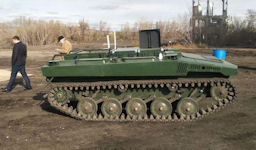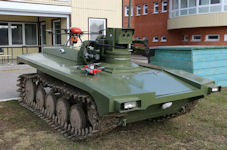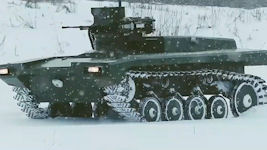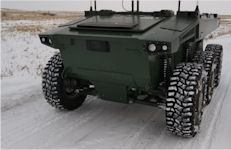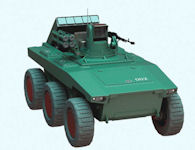Marker Experiment Robot Platform
The Marker Experiment Robot Platform is a joint project of the National Center for the Development of Technologies and Basic Elements of Robotics of the Foundation for Advanced Research [the Russian response DARPA Defense Advanced Research Projects Agency] and the Scientific and Production Association "Android Technology". "Marker" was launched in March 2018. As part of the first stage of the project, two tracked platforms were assembled and commissioned. During the second stage, two vehicles on a wheeled chassis were created.
The evolution of modern ground-based robotic systems (RTK) for military purposes is moving towards increasing the ability to perform tasks in an autonomous mode with a gradual decrease in the involvement of the operator in the process of controlling the RTK. To increase the level of autonomy of ground-based RTKs, the development of a number of key technologies is required, which together determine the appearance of promising RTKs. Therefore, it is urgent to develop robotics technologies and bring them to the level of readiness that allows the technologies being created to be applied on promising autonomous RTKs in real conditions.
To test the technologies being created, to bring their level of readiness, a mobile demonstrator of robotics technologies was created using the modular-modular design principle, with an open information architecture of construction, which provides the ability to conduct a full-scale development of technologies and basic elements of ground-based robotics.
Shooting tests of the Marker platform were scheduled for the first half of 2020. During the tests, the platform will hit targets in autonomous mode using various types of payloads. The unified payload module with optoelectronic instrumentation has six independent rotation axes and the ability to install two types of payload, which can be used independently of each other. The turn rate of payload elements is hundreds of degrees per second, which makes it possible to significantly improve speed and accuracy characteristics.
The first demonstration of the results of the development of the experimental robot "Marker" took place on 17 October 2020 in Magnitogorsk. According to the Foundation for Advanced Research (FPI) : "During the demonstration, the movement of the robotic complex along a given route over rough terrain, autonomous movement with the identification and avoidance of obstacles, autonomous launch of unmanned aerial vehicles from the board of the car were performed".
During the first phase of the project, two tracked platforms for testing ground robotics technologies were created, equipped with a unified payload module and a cluster launch module for UAVs. The unified payload module with optoelectronic instrumentation has six independent rotation axes and the ability to install two types of payload, which can be used independently of each other. The turn rate of payload elements is hundreds of degrees per second, which makes it possible to significantly improve speed and accuracy characteristics. The UAV cluster launch module provides autonomous launch from the platform of a large group of unmanned aerial vehicles, each of which can perform tasks both as part of a group and individually.
With the use of the platform, technologies of automatic routing and autonomous traffic control in urban areas and on rough terrain are being developed. When the platform moves, its functional systems automatically make adjustments to the route, taking into account the stationary and moving obstacles detected by the sensors.
The autonomy of the platforms is ensured by a modular multispectral vision system, in which data processing is carried out by the most modern neural network algorithms. The platform gains full awareness of the surrounding space at a distance of more than one hundred meters, which makes it possible to timely correct movement under the control of the operator without his direct intervention. Modular solutions, the technologies of which are being developed in the course of the project, should provide a new level of unification of the basic elements of robotic systems and the expansion of their functionality.
The "Marker" project has been implemented by the National Center for the Development of Technologies and Basic Elements of Robotics FPI and NPO Android Technology since March 2018. During the first phase of the project, two tracked platforms were created for testing ground robotics technologies, equipped with a unified payload module and a cluster launch module for small UAVs. "Modular solutions, technologies of which are being developed in the course of the project, should provide a new level of unification of the basic elements of robotic systems and the expansion of their functionality," the Foundation notes. The demonstration took place as part of a visiting meeting of the working group of the Scientific and Technical Council of the Military-Industrial Commission.
Experimental robotic platform "Marker" in a completely autonomous mode overcame a segment of the path length of 30 kilometers. The tests were carried out in the Chelyabinsk region in December 2020. The route of the car was laid through an unprepared territory - a forest-steppe with a snow cover. The autonomous platform motion control system, having received a route assignment with the coordinates of a given point, ensured the platform's arrival at the finish line in an hour and a half, relying on the data of the technical vision system built on new neural network algorithms. The autonomous platform motion control system provides autonomous laying and adjustment of the movement route in the event of obstacles - trees, rises, ravines, bushes, etc.
The technical characteristics of the platform provide the possibility of autonomous operation for up to 48 hours on paved roads and up to 24 hours on rough terrain. As part of the next tests, the Marker platform will have to cover 50, 100 and 200 kilometers.
|
NEWSLETTER
|
| Join the GlobalSecurity.org mailing list |
|
|
|


